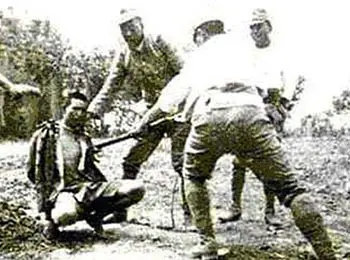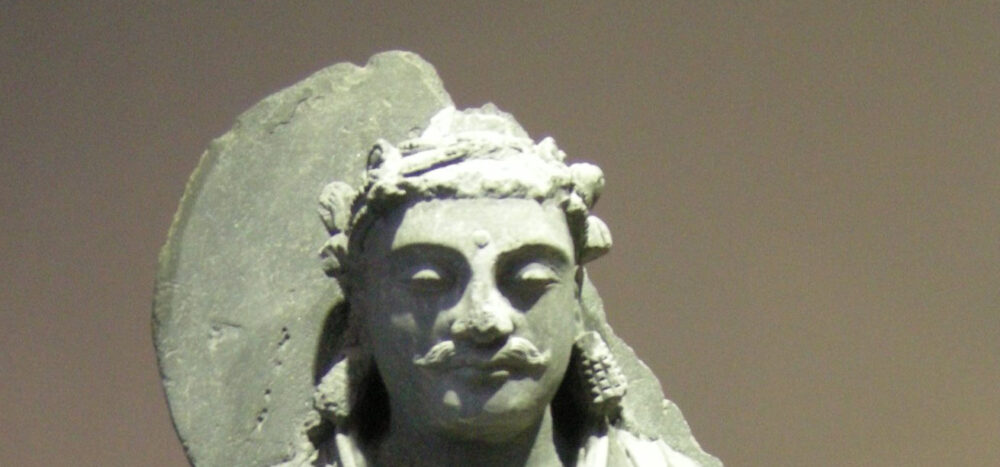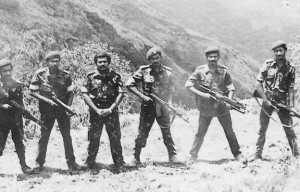Murderers are the extreme example of people who are carried away to catastrophe by the rigidity of their false world-view. They are in ‘mind-forg’d manacles’ long before they are put behind prison bars. As the very first verse of the Dhammapada puts it, “Our life is shaped by our mind; we become what we think. Suffering follows an evil thought as the wheels of a cart follow the oxen that draw it” (in the translation of Eknath Easwaran).
The many years of a Life sentence can be very constructive ones for those who suffered a hectic, tormented, frightened childhood and youth and have never had the time and sobriety to get a perspective on their behaviour.
I met Karl in Kingston Prison, ten years into his Life sentence. He was short, with a battle-scarred face and tattoos. He had a poor level of literacy and very little education, but was throwing himself into learning. I quote below from a little book he wrote with me in my capacity as writer-in-residence at the prison (Hand on the Glass by Karl, Waning Moon Press, 1999, available from me).
“Fear seizes the body with shivering. You read about the techniques in reports of torture.” Karl is the child of a sadistic mother. “I was stripped naked, thrown in the corner, slapped and shouted at, slapped again and again, the slaps accompanied by continuous screaming, anger and spitefulness pouring down on me. She was ill. She was devious to the point of insanity. You could see the hatred in her smile, her posture, her eyes. She’d steal my sweets and smile at me. I got sneaky and told lies like her. It turned me into an arsehole like her. The hatred is vivid for ever.”
Karl went to Borstal, and what he had learned from his mother set the pattern for how to cope. “I knew that the weak are vulnerable. I wasn’t going to let anyone take advantage. I was frightened, and the only way I knew to be safe and gain respect was by aggression. I weigh a man up: if he’s going to stand up I’ll have to dive straight in, very hard, and use extreme violence. If threats will do, I’ll manipulate him through threats. When Officers want to hear “Yes,” I’ll say, “Yes.””
As a young adult he was a hot-wired volatile mix of hatred, fear, heroin, alcohol, pills, greed and violence. He was extremely dangerous, I have no doubt, and as criminal as can be. He would be your worst nightmare, standing at the bar at lunchtime in a Brighton pub, smiling. He describes his companions: “The people I was knocking about with were not decent rational people. We’d pull stokes on others all the time. A criminal isn’t just someone who steals or breaks the law. He started at the age of 5 or 6. He’s been through approved school, Borstal, DCs and all the time he’s picking up new ways of intimidating and manipulating people. The criminal will always tell you what you want to hear. I’m lying – I don’t know why yet, but I’m doing an oil painting of myself, and I’m hoping to take you with it. Knowing I’m a failure, to keep people at bay, the easiest thing is to be aggressive.”
Heroin was the best solace. “I was depressed, tense, angry when I had my first mainline given by a friend and the effect was immediate. My inner feeling was serene, for the first time in my life, and it became my favourite drug instantly. It cut me off from my feelings, all those bad feelings, a lifetime of humiliation, bitterness and aggression. Then I was sick. Whoosh. That was a problem, but then I got another lift, even higher.”
The second of my four daily Buddhist vows is, “The afflicting passions are inexhaustible, I vow to end them all.” Karl and his like struggle to overcome the suffering of being endlessly assailed by the afflicting passions, using the onefold path of intoxication. I am told that Jung wrote a letter to the founder of Alcoholics Anonymous saying that he had always thought that the craving for alcohol and drugs was a desire for God or a religious “spirit.” I worked with criminal teenagers at one time and got them writing poems about LSD. Darrell wrote, “The normal world is shit. / When you’re tripping / the sea is a living thing, / the sea-breeze is a voice… You’re aware, / every little thing seems more alive. / Nature is more beautiful when you’re tripping.”
Tastes of serenity, awareness and beauty in the bleakest of “shit” lives: drugs are the poor man’s transcendence (many of the rich like them too).
Karl was arrested for murder. “If you’ve always received smacks, dished out smacks, never thought, got away with it, surviving day to day, not caring, no outlook, no character, you’re a disaster waiting to happen. It’s a terrible shame for his [the victim’s] family that it has taken his death for me to see what an arsehole I’ve been,” he reflects.
He describes his attitude when he got to prison: “Create an incident and run. I’m scared of myself. I might get violent and do something again. I don’t want to be alive. I’m running. I don’t talk to anyone except for necessary drug deals. Stay away, keep clear of me – I’m angry.”
Again he analyses it: “Somebody comes up and strikes up a conversation and I cut them off, give a short answer. I have no trust, wary, suspicious. I’m the one who is going to take advantage of you, I’m projecting my thoughts into you: you can’t be trusted. My mother took advantage, so I expect everybody to. Friends are a no-no. It’s lonely, very lonely, a loneliness you come to like. I’d go in arrogant and demanding, to create a bit of fear, or, with a dangerous man, go in subtle, drop my body-language, keep eye-contact to create a bit of trust, then I’m off with whatever I can get. You can’t build friendship with people you’ve took advantage of.”
Four years into his sentence Karl applied for group therapy. “It’s hard to let go. It’s tense in my chest and arms. When I begin to open up it’s scary. I have to let the barriers down. I feel weaker, I feel I’ve got nothing. Instead of being domineering I just back off and don’t try to control. I have to listen to your opinions though it doesn’t feel right. Sitting there through my discomfort I learned to listen and understand. I used to just walk off ranting and raving with my own opinion in my head, but now I walk off with a sense of achievement – what’s achieved is you’re listening to me! It feels good. Puts a bounce in my stride.”
He heard that others had suffered like he had. “I’m not the only one!” He heard people tell how they had changed. And he felt the change: “When I first went I was hostile. I didn’t care. People told me I was an arsehole. But I let slip my birthday, and they surprised me, gave me presents, and I cried. You’ve got to give. Give to others. It’s what opens everything else for you. Put yourself out. It’s done so much for me.”
Hugh Collins, notorious Glasgow gangster and murderer, wrote an account of his transformation in the therapeutic community which was the Special Unit at Barlinnie Prison (Hard Man, in Granta 46, 1994). He was severely disoriented when he first arrived because nothing fitted his world-view. The toughest criminals were being friendly with the screws, the enemy, “joking and laughing and talking as if they were normal people.” Jimmy Boyle, the most famous of Scotland’s dangerous men, was the “undeniable leader” in the Unit. He came to Hugh Collins on his second day and said, “You’re fucked up. You don’t think you are, but you’re completely fucked up. So was I when I arrived here. It took me six months to recover.”
Collins took a cocktail of drugs and his rage exploded. He demanded a transfer back to a normal prison and threatened staff. He was ‘hotseated’ in a community meeting. “The meeting’s resolution was not to mete out punishment, but to develop ways of supporting me through my difficulties. What the fuck was going on?”
The man who had never in his life received sympathetic treatment, hated it. He drank a bottle of whisky and attacked Jimmy Boyle. “I was put in a cell so I could sober up in peace. I didn’t understand.” He was bewildered by the lack of a violent response. He always expected to be hit back, especially by the prison system, and he wanted it to be that way, fitting in with his image of how things operate. Next morning Jimmy Boyle came to see him and said, “You have to understand how really fucked up you are,” and suggested he write out all his emotions. “Try to find out who you are and what has made you this way.”
That question, ‘Who am I?’ familiar to all of us in the Buddhist community, is what proved to be the key for Hugh Collins. He realised, examining it, that he had dedicated his whole life to a fantasy image of his father as the hard-man master criminal. He had hardly known his father, of course, during childhood, because the old man had always been in prison, but he had absorbed the legends of derring-do and the sense of awe felt by weaker people in the presence of the brute.
Collins in his twenties: “I knew what it was like to take someone’s life. I was a very powerful man, and I was powerful because I was dangerous, and I was dangerous because I was prepared to be, and everyone knew I was fully capable of being so very, very violent. I had become my father… Or perhaps I had become nothing more than what I thought my father was.” Collins recalled that he got to see more of his father at that time and had to keep rescuing him from scrapes. “For the first time, I saw him for what he was. My father was not a hard man. The hard man was a lie. Robin Hood? He was a drunk, poncing money from a burnt-out prostitute half his age. He was not someone I wanted to be. What I wanted to be had been a lie. It didn’t exist.
“But just look at what the lie had created.”
I have been trying to avoid the word “awakening” for the turnaround in understanding that eventually dawned on Karl and on Hugh Collins. Of course, it is not enlightenment. But it has the structural characteristics we find in enlightenment literature. It involves destroying and discarding an entire world-view and set of false values, values which are deeply rooted as the main prop of the sense of identity. It involves a recognition of ‘Who am I?’ and a sloughing off of the false identity. It involves a breakthrough to seeing things more nearly as they really are, and accepting them without needing to hammer them into another shape to make them fit the world-view. It involves feeling a renewed rewarding reciprocity with other human beings. It brings joy.
The Dhammapada continues, in verse three, “ ‘He was angry with me, he attacked me, he defeated me, he robbed me’ – those who dwell on such thoughts will never be free from hatred.” And verse five explains how to break the cycle. “For hatred can never put an end to hatred; love alone can. This is an unalterable law.”
I am sure many gangsters and violent brutes never receive a surprise birthday present, or loving attention in the form of, “You’re fucked up.” It is an unalterable law that they must receive some love to change. They must be in a state of readiness too. Karl writes, “I was not seeing people. I was blind. It happened a few times that someone was genuinely concerned about me, but I mistrusted it. I didn’t let anybody in.”
Many gangsters and brutes may not have the intelligence and strength of character to face up to themselves, accept how wrong they have been, and determine to change. I see them in prison and amongst young offenders: men and boys who have intimations of the right Way, but will backslide weakly, put off the necessary work by running to alcohol and drugs, and cave in to peer group braggadocio. They are not going to loosen up, admit cracks in their rigid systems of thought, or climb out of the carapace of identity they have forged for themselves and their kin.
Those who do change, as Hugh Collins and Karl have done, show remarkable and impressive human qualities, the finest of all human qualities, shadowing the path to enlightenment. The great adventure of being human fetches up here. Unfortunately, it also seems to be an unalterable law that such understanding costs a fortune in suffering. “It’s a terrible shame for his family that it’s taken his death for me to see what an arsehole I’ve been,” writes Karl. Yes. The martyrs to thugs like Hugh Collins, and the unreformed political criminals on the left and right to whom ideologies were more real than people, who became what they thought, are legion.



